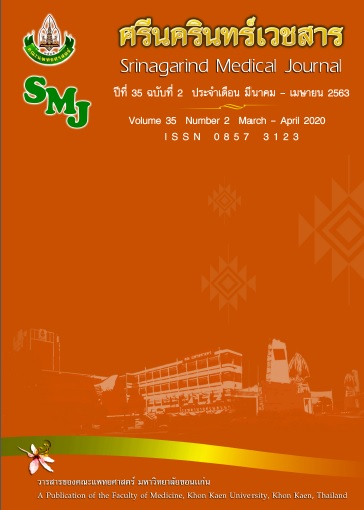Efficacy and Safety of Imatinib in Patients with Unresectable or Metastatic Gastrointestinal Stromal Tumors (Gists): A Retrospective Cohort Study
Keywords:
อิมมาตินิบ; ประสิทธิภาพ; ความปลอดภัย; มะเร็ง, Imatinib; Efficacy; Safety, Gastrointestinal; stromal tumors (GISTs)Abstract
Background and Objective: Imatinib is a standard treatment of unresectable or metastatic gastrointestinal stromal tumors (GISTs). In Thailand, the prevalence and effect of treatment in unresectable or metastatic GISTs who receiving imatinib are limited. This study was to assess efficacy and safety of imatinib in patients with unresectable or metastatic GISTs
Methods: The retrospective study collected data from medical records and electronic databases of unresectable or metastatic GISTs. Inclusion criteria were aged ≥18 years old with diagnosed unresectable or metastatic GISTs who received imatinib 400 mg/day as first-line treatment and performance status (ECOG) 0 – 2. Patients with no data for evaluation of efficacy or safety, pregnancy/lactation and terminally ill were excluded. Endpoints were efficacy evaluation included progression-free survival (PFS), overall survival (OS), response rate (RR) and safety evaluation.
Results: A total of 21 patients, but 1 patient is unable to analyze efficacy outcomes due to receiving less than 3 months of imatinib. Efficacy showed PFS 6.4 years (95% CI 3.0-9.8), OS 8.2 years (95% CI 4.0-12.3). 20% patients attained a partial response, 25% patients revealed a stable disease and 55% patients had a progressive disease. Hematologic toxicities were anemia (86%), neutropenia (38%), thrombocytopenia (29%). The most common non-hematologic toxicities were eyelid edema (71%), edema (43%), weight gain (43%), nausea/vomiting (38%), increasing liver function (33%). In addition, serious adverse events were deep vein thrombosis (5%) and 1 patient admitted with plural effusion and then lost follow up.
Conclusions: Unresectable or metastatic GISTs receiving imatinib at 400 mg/day had PFS 6.4 years, OS 8.2 years, and RR 20%. The most common adverse event were anemia and eyelid edema and the serious adverse event was plural effusion.
References
2. National Comprehensive Cancer Network. Clinical Practice Guidelines in Oncology (NCCN Guideline) Soft tissue Sarcoma version 2.2019 [Internet]. 2019 [cited May 31, 2019] Available from https://www.nccn.org/professionals/physician_gls/pdf/sarcoma.pdf.
3. Søreide K, Sandvik OM, Søreide JA, Giljaca V, Jureckova A, Bulusu VR. Global epidemiology of gastrointestinal stromal tumours (GIST): A systematic review of population-based cohort studies. Cancer Epidemiol 2016; 40: 39-46.
4. สถาบันมะเร็งแห่งชาติ กรมการแพทย์ กระทรวงสาธารณสุข. ทะเบียนมะเร็งระดับโรงพยาบาล พ.ศ. 2560. กรุงเทพฯ: บริษัทพรทรัพย์การพิมพ์ จำกัด; 2561.
5. Lopes LF, Bacchi CE. Imatinib treatment for gastrointestinal stromal tumour (GIST). J Cell Mol Med. 2010; 14(1-2): 42–50.
6. Verweij J, Casali PG, Zalcberg J, LeCesne A, Reichardt P, Blay, et al. Progression-free survival in gastrointestinal stromal tumours with high-dose imatinib: randomised trial. Lancet 2004; 1;364(9440):1127-34.
7. Ryu MH, Kang WK, Bang YJ, Lee KH, Shin DB, Ryoo BY, et al. A prospective, multicenter, phase 2 study of imatinib mesylate in Korean patients with metastatic or unresectable gastrointestinal stromal tumor. Oncology 2009; 76: 326-32.
8. Kim JH, Ryu MH, Yoo C, Chae H, Na H, Beck M. Long – term survival outcome with tyrosine kinase inhibitors and surgical intervention in patients with metastatic or recurrent gastrointestinal stromal tumors: A 14‐year, single‐center experience. Cancer Med 2019; 8: 1034-43.
9. Bouché O, Cesne AL, Rios M, Chaigneau L, Italiano A, Duffaud F, et al. EPIGIST: An observational real-life study on patients with metastatic gastrointestinal stromal tumors receiving imatinib. PLoS One 2018; 13: e0204117.
10. Blay JY, Le Cesne A, Ray-Coquard I, Bui B, Duffaud F, Delbaldo CProspective Multicentric randomized phase III study of imatinib in patients with advanced gastrointestinal stromal tumors comparing interruption versus continuation of treatment beyond 1 year: The French Sarcoma Group. J Clin Oncol 2007; 25: 1107-13.
11. Patrikidou A, Chabaud S, Ray-Coquard I, Bui BN, Adenis A, Rios M, et al. Influence of imatinib interruption and rechallenge on the residual disease in patients with advanced GIST: results of the BFR14 prospective French Sarcoma Group randomised, phase III trial. Ann Oncol 2013; 24: 1087-93.
12. Schlemmer M, Bauer S, Schütte R, Hartmann JT, Bokemeyer C, Hosius C, et al. Activity and side effects of imatinib in patients with gastrointestinal stromal tumors: data from a German multicenter trial. Eur J Med Res2011; 16: 206-12.
13. Nishida T, Shirao K, Sawaki A, Koseki M, Okamura T, Ohtsu A, et al. Efficacy and safety profile of imatinib mesylate (ST1571) in Japanese patients with advanced gastrointestinal stromal tumors: a phase II study (STI571B1202). Int J ClinOncol 2008; 13: 244-51.
14. Eisenhauer EA, Therasse P, Bogaerts J, Schwartz LH, Sargent D, Ford R, et al. New response evaluation criteria in solid tumours: revised RECIST guideline (version 1.1). Eur J Cancer 2009; 45: 228-47.
15. The National Cancer Institute (NCI) of the National Institutes of Health (NIH). Common Terminology Criteria for Adverse Events (CTCAE) Version 5.0. [Internet]. 2017 [cited July 11, 2019] Available from https://ctep.cancer.gov/protocoldevelopment/electronic_applications/docs/CTCAE_v5_Quick_Reference_5x7.pdf.
16. Casali PG, Zalcberg J, Le Cesne A, Reichardt P, Blay JY, Lindner LH, et al. Ten-year progression-free and overall survival in patients with unresectable or metastatic GI stromal tumors: Long-term analysis of the european organisation for research and treatment of cancer, Italian Sarcoma Group, and Australasian Gastrointestinal Trials Group Intergroup Phase III randomized trial on imatinib at two dose levels. J Clin Oncol 2017; 35: 1713-20.
17. Farag S, Verheijen RB, Martijn Kerst J, Cats A, Huitema AD, Steeghs N. Imatinib pharmacokinetics in a large observational cohort of gastrointestinal stromal tumour patients. Clin Pharmacokinet 2017; 56: 287-92.




